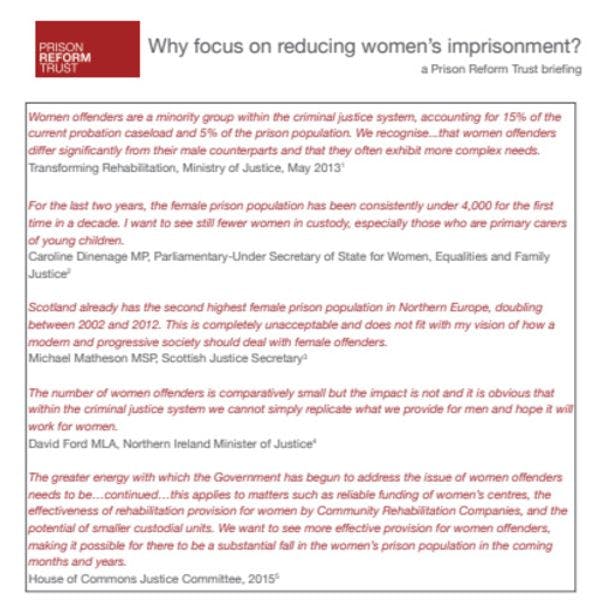¿Por qué centrarse en reducir el índice de encarcelamiento de mujeres?
Según Prison Reform Trust, la mayor parte de las soluciones a la delincuencia entre mujeres se halla fuera de las cárceles, en el tratamiento de las adicciones y los problemas de salud mental, la protección contra la violencia doméstica y las relaciones coercitivas, la vivienda segura, la gestión de las deudas, la educación, el desarrollo de habilidades y el empleo. Más información, en inglés, está disponible abajo.
Suscríbase a las Alertas mensuales del IDPC para recibir información sobre cuestiones relacionadas con políticas sobre drogas.
This report by Prison Reform Trust shows that women’s prison population in England and Wales more than doubled between 1995 and 2010, from 1,979 to 4,267. More recently the numbers have declined by 10% – from 4,279 women in April 2012 to 3,841 in April 2015. Across the UK, more than 13,500 women are imprisoned each year.
A series of inquiries and reports in recent decades, 7 most notably the 2000 report of the Prison Reform Trust’s Committee on Women’s Imprisonment (the Wedderburn Report), the 2007 Review of Women with Particular Vulnerabilities in the Criminal Justice System (the Corston Report), the 2011 report of the Women’s Justice Taskforce (Reforming Women’s Justice), and the Scottish Government’s Commission on Women’s Offenders in 2012, have all concluded that prison is rarely a necessary, appropriate or proportionate response to women who get caught up in the criminal justice system. The Justice Select Committee inquiry into women offenders concluded that “prison is an expensive and ineffective way of dealing with many women offenders who do not pose a significant risk of harm to public safety” and called for “a significant increase in residential alternatives to custody as well as the maintenance of the network of women’s centres” seen as “more effective, and cheaper…than short custodial sentences”.
Keep up-to-date with drug policy developments by subscribing to the IDPC Monthly Alert.
